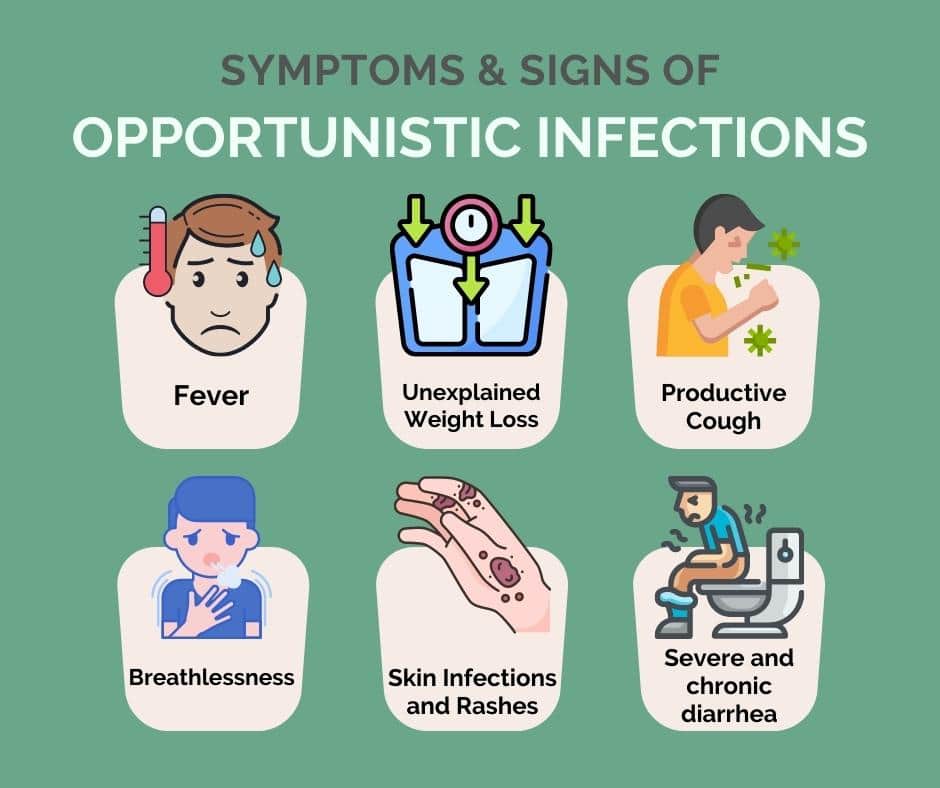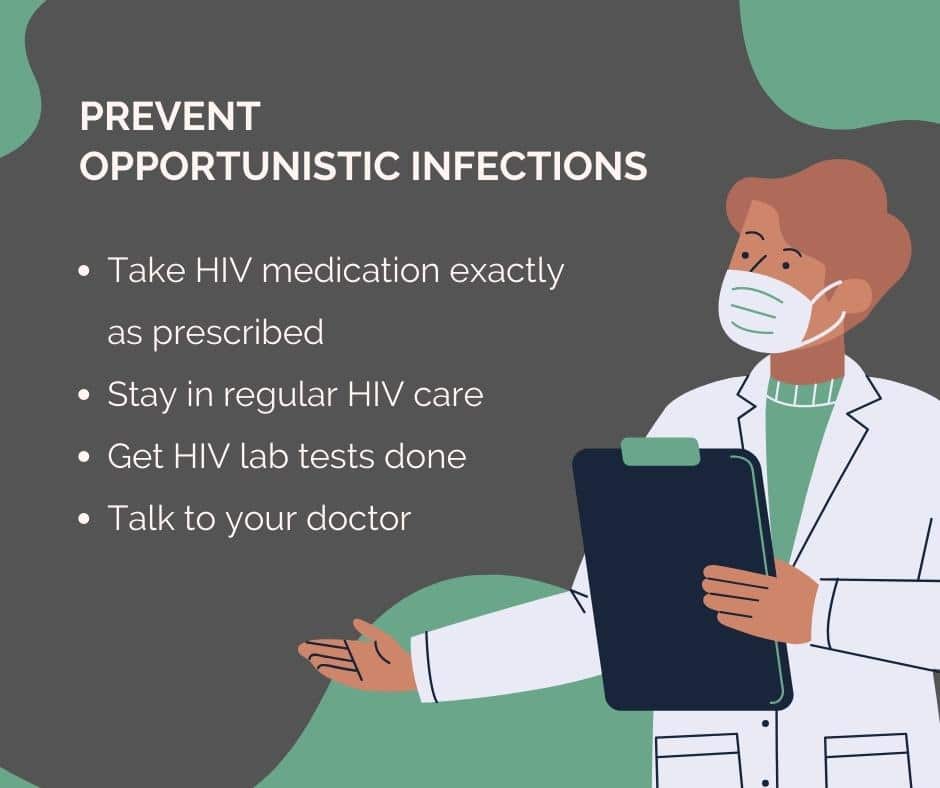HIV can eventually cause AIDS by attacking a type of white blood cell called a CD4 cell. CD4 cells are the same cells in the immune system that are supposed to protect the body from disease. When your immune system loses too many CD4 cells, you are less able to fight off infection and can develop serious illnesses, cancers, and neurological (nerve system) problems. These problems are called opportunistic infections (OIs) because they take advantage of the body’s weakened defenses.
List of contents
What are opportunistic infections?
Opportunistic infections (OIs) are infections that occur more often or are more severe in people with weakened immune systems than in people with healthy immune systems. People with weakened immune systems include people living with HIV.
OIs are caused by a variety of germs (viruses, bacteria, fungi, and parasites). OI-causing germs spread in a variety of ways, for example, in the air, in body fluids, or in contaminated food or water. Some OIs that people with HIV may get include candidiasis, Salmonella infection, toxoplasmosis, and tuberculosis (TB).

Today, OIs are less common in people with HIV because of effective HIV treatment. But some people with HIV still develop OIs because they may not know they have HIV, they may not be on HIV treatment, or their HIV treatment may not be working properly.
Many OIs are considered AIDS-defining conditions. That means if a person with HIV has one of these conditions, they are diagnosed with AIDS, the most serious stage of HIV infection.

What Causes Opportunistic Infections?
OIs are caused by a variety of germs (viruses, bacteria, fungi, and parasites). These germs spread in different ways, such as in the air, in body fluids, or in contaminated food or water. They can cause health problems when a person’s immune system is weakened by HIV disease.
Why do people with HIV get OIs?
Once a person has HIV, the virus begins to multiply and damages the immune system. A weakened immune system makes it harder for the body to fight off OIs.

HIV medicines prevent HIV from damaging the immune system. But without treatment with HIV medicines, HIV can gradually destroy the immune system and advance to acquired immunodeficiency syndrome (AIDS). Many OIs, for example, certain forms of pneumonia and TB, are considered AIDS-defining conditions, which are infections and cancers that are life-threatening in people with HIV.
Who Is at Risk for Opportunistic Infections?
People living with HIV are at greatest risk for OIs when their CD4 count falls below 200. However, some OIs can occur when a person’s CD4 count is below 500. That’s because weakened immune system makes it harder for the body to fight off HIV-related OIs.
Can Opportunistic Infections Be Treated?
If you develop an OI, there are treatments available such as antiviral, antibiotic, and antifungal drugs. The type of medicine used depends on the OI.
Once an OI is successfully treated, a person may continue to use the same medicine or an additional medicine to prevent the OI from coming back. Having an OI may be a very serious medical situation and its treatment can be challenging.
How Can You Prevent Getting Opportunistic Infections?
The best way to prevent OIs is to take HIV medication daily as prescribed so that you can get and keep an undetectable viral load and keep your immune system strong.
It is also important to stay in HIV medical care and get lab tests done. This will allow you and your health care provider to know when you might be at risk for OIs and discuss ways to prevent them.
There are also steps you can take to prevent getting OIs:
- Talk to your health care provider about medicines and vaccines that prevent certain OIs.
- Use condoms every time you have sex.
- Prevent exposure to other sexually transmitted diseases.
- Don’t share needles, syringes, or other drug injection equipment (for example, cookers).
- Limit your exposure to germs that could make you very sick. This includes tuberculosis or germs found in the stools, saliva, or on the skin of animals. After any contact with human or animal feces, wash your hands thoroughly with warm, soapy water.
- Don’t consume certain foods, including undercooked eggs, raw milk and cheeses, unpasteurized fruit juices, or raw seed sprouts.
- Don’t drink untreated water, such as water directly from lakes or rivers. Avoid drinking tap water in foreign countries. Use bottled water or water filters.
Are Opportunistic Infections Common in People with HIV?
OIs are less common now than in the early days of HIV and AIDS when there was no treatment. Today’s HIV medicines (called antiretroviral therapy or ART) reduce the amount of HIV in a person’s body and keep the immune system stronger and better able to fight off infections.
However, OIs are still a problem for many people with HIV. Some people with HIV get OIs for the following reasons:
- They may not know that they have HIV. Therefore, they are not getting HIV treatment.
- An OI may be the first sign that they have HIV.
- They may know that they have HIV, but they are not getting HIV treatment.
- They were living with HIV for a long time before they were diagnosed and so have a weakened immune system
- They are taking ART, but their drug combination is not working as expected and is not keeping their HIV levels low enough for their immune system to fight off infections or are not controlling their HIV.

What are Some of the Most Common Opportunistic Infections?
- Candidiasis or thrush a fungal infection in your mouth, throat, or vagina
- Invasive cervical cancer starts within the cervix (the lower part of the uterus at the top of the vagina) and spreads (becomes invasive) to other parts of the body.
- Coccidioidomycosis This illness is caused by the fungus Coccidioides. It is sometimes called valley fever, desert fever, or San Joaquin Valley fever.
- Cryptococcosis usually affects the lungs or the central nervous system (the brain and spinal cord), but it can also affect other parts of the body.
- Cryptococcus (crypto) Crypto is a diarrheal disease caused by a tiny parasite called Cryptosporidium. Symptoms include abdominal cramps and severe, chronic, watery diarrhea.
- Cryptosporidiosis and microsporidiosis infections of microscopic animals called protozoa that mess up your gut
- Cystoisosporiasis This infection is caused by the parasite Cystoisospora belli (formerly known as Isospora belli). can enter the body through contaminated food or water. Symptoms include diarrhea, fever, headache, abdominal pain, vomiting, and weight loss.
- Cytomegalovirus (CMV) a virus that causes eye disease and can lead to blindness. It can also cause severe diarrhea and ulcers.
- Herpes simplex virus (HSV) a group of viruses that cause sores around your mouth (cold sores) and on your genitals
- Lymphoma refers to cancer of the lymph nodes and other lymphoid tissues in the body. There are many kinds of lymphomas. Some types, such as non-Hodgkin lymphoma and Hodgkin lymphoma, are associated with HIV.
- Mycobacterium avium complex (MAC) bacteria that cause fevers, problems with digestion, and serious weight loss
- Pneumocystis pneumonia (PCP) a fungus that causes a deadly lung infection
- Progressive multifocal leukoencephalopathy (PML) a virus that affects your brain
- Toxoplasmosis a disease caused by a parasite that can lead to encephalitis, which is an inflammation of the brain, as well as blurry vision and eye damage
- Tuberculosis (TB) is caused by a bacterium called Mycobacterium tuberculosis. TB can spread through the air when a person with TB coughs, sneezes, or speaks. Breathing in the bacteria can lead to infection in the lungs. Symptoms of TB in the lungs include cough, tiredness, weight loss, fever, and night sweats.
References
AIDS and Opportunistic Infections
- cdc.gov/hiv/basics/livingwithhiv/opportunisticinfections.html
HIV and Opportunistic Infections, Coinfections, and Conditions
- hivinfo.nih.gov/understanding-hiv/fact-sheets/what-opportunistic-infection
Opportunistic Infections
- hiv.gov/hiv-basics/staying-in-hiv-care/other-related-health-issues/opportunistic-infections
What Are Opportunistic Infections?
- thewellproject.org/hiv-information/what-are-opportunistic-infections
What Opportunistic Infections Do You Get With HIV?
- webmd.com/hiv-aids/guide/aids-hiv-opportunistic-infections-stay-healthier
Last Updated on 24/10/2024 by ทีมที่ปรึกษา มูลนิธิเพื่อรัก

